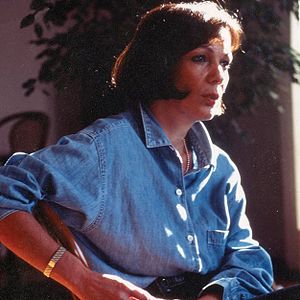Esther Cohen

Esther Cohen Dabah (born 1949) is a Mexican writer and academic.[1]
Early life
Esther Cohen Dabah was born in Mexico City, Mexico, in 1949.[1] Her parents were both Jewish immigrants to Mexico: Her father was Moisés Cohen, who immigrated from Turkey, and her mother was Sarah Dabah de Cohen, who came from Syria.[2]
Cohen began her studies at the National Autonomous University of Mexico (UNAM), where she received a master's degree in modern English literature. She subsequently received a PhD from the same institution.[3]
Career
Cohen began teaching at UNAM in 1975.[4] She became a researcher at UNAM's Institute of Philological Research, where she has led the Poetry Center. In 2015, she began overseeing the center's magazine, Acta Poética.[5][1] In 2019, she was honored as a member of the university's emeritus staff.[6]
In 1982, Cohen traveled to the University of Bologna in Italy, where she studied semiotics under the writer and philosopher Umberto Eco.[3] Her research has frequently dealt with Kabbalah, a form of Jewish mysticism, including during the medieval period.[2][3] She has also published works on the persecution of witches in Renaissance Europe, as well as on historical memory and narrative of the Holocaust.[7][8] Her work is heavily influenced by the scholars Emmanuel Levinas, Jacques Derrida, and Walter Benjamin.[9]
She has published a wide variety of essays and translations in both domestic and international journals.[3] She is a translator of English, French, Italian, and Portuguese, having produced her first work of translation in 1994 for a collection on the Zohar, a foundational Kabbalah text.[1]
Cohen received the National University Prize in 2010 for her work in the humanities.[4] That same year, she also won the Manuel Levinsky Prize from the Mexican Association of Jewish Writers and Journalists.[1]
Since 2011, she has also served as director of the Memory and Tolerance Museum's Education Center.[1]
Selected works
- La palabra inconclusa (1994)
- El silencio del nombre (1999)
- Con el diablo en el cuerpo. Filósofos y brujas en el Renacimiento (2003)
- Los narradores de Auschwitz (2006)
- La huella del otro (editor)
- Ejercicios de memoria (editor)
References
- ^ a b c d e f "Esther Cohen Dabbah". Universidad Nacional Autónoma de México. 2019.
- ^ a b Cohen Dabah, Esther. (1994). La palabra inconclusa : ensayos sobre Cábala (1. ed. en Taurus ed.). México: Taurus. ISBN 968-19-0224-6. OCLC 33136940.
- ^ a b c d Agencias (6 October 2014). "Esther Cohen Dabah, Prolífica escritora, maestra en Letras Modernas y sobresaliente investigadora universitaria | Diario Judío México". Diario Judío: Diario de la Vida Judía en México y el Mundo (in Spanish). Retrieved 28 August 2020.
- ^ a b "Esther Cohen – Detalle del autor – Enciclopedia de la Literatura en México – FLM – CONACULTA". www.elem.mx. Retrieved 28 August 2020.
- ^ "Esther Cohen Dabah" (in European Spanish). Retrieved 28 August 2020.
- ^ "Programa de Estímulos y Reconocimiento al Personal Académico Emérito (PERPAE) 1941–2020" (PDF). Universidad Nacional Autónoma de México.
- ^ Cohen, Esther. (2018). Con el diablo en el cuerpo : filósofos y brujas en el Renacimiento. Debolsillo. ISBN 978-607-31-6278-4. OCLC 1050270966.
- ^ Cohen Dabah, Esther. (2006). Los narradores de Auschwitz. México: Editorial Fineo. ISBN 987-21897-9-X. OCLC 65517938.
- ^ Garza Saldívar, Norma (May–August 2011). "Pensar lo otro: Entrevista a Esther Cohen Dabah". Andamios (in Spanish). 8 (16): 139–152. doi:10.29092/uacm.v8i16.468. ISSN 1870-0063.
